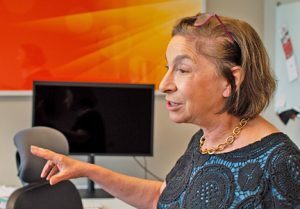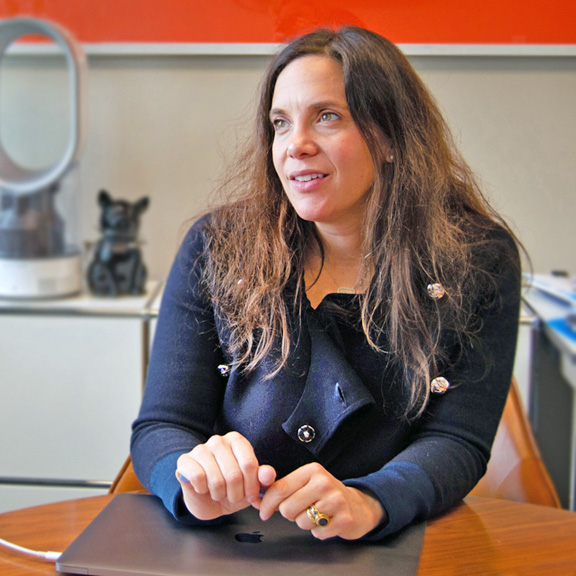By SHANDRA MARTINEZ
AUBURN HILLS – Steve Tronstein jokes that his oldest daughter’s return to the family furniture business was a step up after working for President Bill Clinton and Nobel Laureate Steven Chu, Energy secretary during the Obama administration.

Steve Tronstein oversees
merchandising.
“It just keeps on getting better,” he laughs.
Rachel Tronstein is president of Gardner-White Furniture Co., which recently was named retailer of the year by the International Home Furnishings Representatives Association.
She is the fourth generation to run the business started by Eugene Clinton White and John G. Gardner in 1912, when Michigan was still home to the furniture capital of the world. Her maternal grandfather, Irwin Kahn, bought the store in the 1950s, keeping the name. Much of the retailer’s growth has come in the past three decades, under the leadership of her parents, Barb and Steve.
The retailer, which competes with Warren-based Art Van for the mid-market segment, operates 10 stores across Southeast Michigan. The family-owned company has a workforce of about 500 employees and annual sales of more than $120 million.
During its centennial in 2012, Gardner-White relocated its headquarters to the home of a 450,000-square-foot former GM supplier’s warehouse. The massive facility at 4445 N. Atlantic Road in Auburn Hills now houses a distribution center, store and outlet.
In April, the company was named Retailer of the Year by the International Home Furnishings Representatives Association (IHFRA), a High Point, N.C.-based organization of 2,300 sales associates.
One reason for the award is the respect Gardner-White shows for sales reps. They are treated like family, says Albert David, IHFRA’s president and a sales representative for Ashley Furniture who has worked with the retailer for 12 years.
While Gardner-White is a regional player in the industry, it has a reputation for being innovative.
In 2014, Gardner-White became the first furniture retailer in the Midwest to launch same-day delivery service that lets customers track delivery time down to a 20-minute window, using GPS technology.
Five years ago, the retailer began converting lights to energy-efficient LED. With Rachel Tronstein’s background, one might assume this was her idea, but the project was spearheaded by her dad.
The cost of the lights was recouped in months because air conditioning bills plummeted over the summer for the stores, which range in size from 40,000 to 60,000 square feet. The result is stores that are more comfortable, Steve Tronstein says.
The retailer has added a recycling center that makes money selling its compressed packaging. Next on the list is exploring how to make its delivery fleet more energy-efficient.
“I’m always looking at it from the energy side, but if it isn’t cost-competitive, we’re not going to do it,” Rachel Tronstein said.
Best Buy picked the retailer for a national pilot in 2012 that put Gardner-White into two of its Detroit area stores. While the electronics chain pulled the plug on the experiment after two years, Gardner-White learned how to capture a customer who isn’t necessarily thinking about a product segment like mattresses.
“No one sleeps well, but it takes a long time for you to become a mattress customer. We helped shorten that time cycle that it would normally take to become a bedding customer,” Tronstein said.
She and her parents are strategic in an industry that tends to react to the ups and downs of sales.
The self-described geek studied economics and political science at the University of Michigan before heading to the London School of Economics. She credits her international graduate school experience for teaching her how to think, much the way law school did for her parents.
“I could have been in school forever but it’s more fun to do something with it,” she said.
Tronstein manages sales and warehouse operations, while her mom oversees advertising and consumer finance and her dad is in charge of merchandising.
Despite growing up talking retail strategy and advertising around the kitchen table, Tronstein said her parents never pressured their two daughters to join the family business. They were surprised when she dropped plans to launch a clean tech startup in the San Francisco Bay area to work at Gardner-White.

Barb Tronstein has been a strategic force during the past few decades.
“I really was concerned because I wasn’t sure that going back to Detroit and being in this kind of business after her exposure all over the world was going to be enough to keep her interested, but she’s done a great job and seems to be very happy,” says her mom, Barb Tronstein.
Her return has been good both professionally and personally. She married dermatologist Brian Stewart in 2015, after the two were set up by a family friend.
Tronstein’s strengths are energy and analytical skills. She also brings fresh eyes to the business because of her experience outside Gardner-White “that the rest of us haven’t had” in a long time, says her mom.
Rachel Tronstein remains a big-picture thinker. When asked about her concerns about the industry, she says she is worried about Michigan’s shrinking middle class and stagnant wages.
She recently was named chairwoman of New Detroit, an organization committed to improving income equity, education and health and safety in Michigan’s biggest city.
“We’re really focusing on providing opportunity and giving people the skills to then go and live and be productive,” she said.
She shares her office with Tron, the family’s beagle mix. Soon, she’ll make room for a crib. At 37, Tronstein is expecting her first child, a daughter.
This first grandchild could be the third generation of women leaders, a rarity in any business.
The child’s career seems destined for medicine or retail. Tronstein’s younger sister is a physician on the West Coast whose husband and father-in-law are doctors.
“She can do anything she wants, but she will have a background in retail,” Tronstein says.






